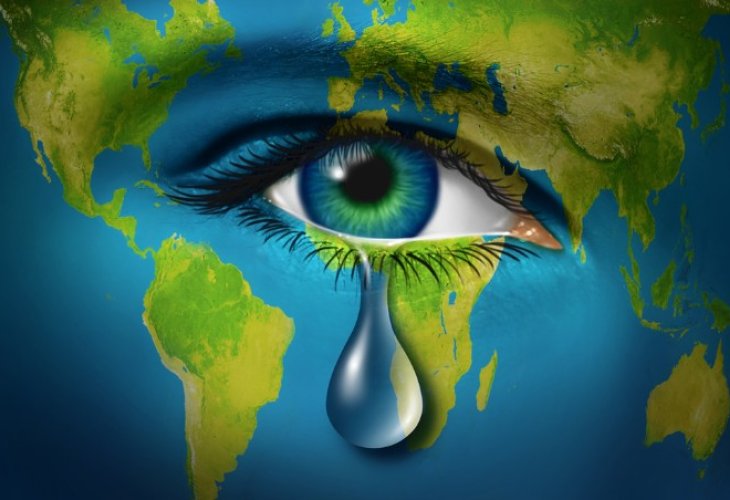Faith
Why Do We Feel Life Is Hard? Uncovering the Truth About Suffering and Joy
A deep dive into Jewish thought on why we notice pain more than blessings—and how to shift our perspective toward meaning, gratitude, and emotional clarity. Ask ChatGPT
 (Photo: shutterstock)
(Photo: shutterstock)Uriah asks: "Hello. I hear people saying that life is full of suffering. But others say we should be grateful for all the good in our lives. Who’s right and where does the truth lie?"
Hello Uriah, and thank you for your thoughtful question.
Judaism doesn’t claim that life is suffering—quite the opposite. The Torah tells us clearly about creation: “And G-d saw all that He had made, and behold, it was very good” (Genesis 1:31).
People who constantly complain about life are often like spoiled children who grumble, not realizing how much love and how many gifts they’ve received. If we look honestly at the human condition, we’ll see that people live in far greater comfort than any other creature on earth—far beyond what’s needed to survive—and all of it is thanks to countless gifts that the Creator has poured upon us. If you compare yourself to a stray cat, you’ll immediately see that you've been given a thousand blessings—first and foremost, the gift of consciousness and intelligence, which allows you to recognize truth and seek meaning.
A mindful person won’t see the world as suffering. In fact, if we look deeply, we can often find purpose even within pain. As Rabbi Akiva said (Talmud Berachot 60): “A person should always say: Everything that the Merciful One does, He does for the good.”
To feel genuine gratitude for life, we need to recognize that the good things in our world aren't random, but they are purposeful and deliberate. G-d didn’t have to create so many kinds of fruit trees, or such a variety of materials in the soil, or such diversity in animals. Humans could have survived just fine with one eye, one ear, without color vision, or even without eyebrows or hair. We could’ve functioned without taste, facial expressions, or vocal speech.
The fact that we have all these extras that are not needed for survival, points to a Creator who wanted to give us joy and beauty. The logical conclusion is that we are expected to use these gifts for good, and through them, to understand that the Creator seeks to benefit us.
 (Photo: shutterstock)
(Photo: shutterstock)Since everything was created with purpose, it makes sense to assume that even our challenges were given to us for a reason. Even what we call “the evil inclination” (our inner urges) has a positive purpose. As the sages said: “If not for the evil inclination, no one would build a house or marry a wife” (Bereishit Rabbah 9:8). This drives ambition, connection, and creativity when channeled correctly.
Pain and suffering take up only a small part of our lives. Most of the time, life is calm, functional, and relatively free of pain, but because pain is more noticeable than pleasure, we tend to forget the daily good and remember mainly the difficult moments. This creates the illusion that life is mostly suffering.
I once heard someone say: If life were mostly suffering, people wouldn’t be asking “Why is there suffering in the world?” Instead, they’d be asking, “How is there any good in the world at all?”
The fact that we question suffering proves that it's the exception, not the rule. We don’t want to get used to pain, and we’re rightly disturbed by its presence. For example, many Jews ask why the Holocaust happened—a horrific six-year tragedy in Jewish history. Very few stop to ask: How did G-d protect the Jewish people for 2,000 years of exile from total annihilation? How did He keep us alive through endless persecution while other nations like the Canaanites, Egyptians, and Greeks, disappeared entirely? That, too, is a miracle we often overlook.
The majority of life truly is filled with good; we just need to train ourselves to see it. Gratitude grows when we become aware of the countless free gifts and acts of kindness we’ve received from our Creator.
In the beautiful words of Maimonides (Rambam) from The Guide for the Perplexed, Part 3, Chapter 12: “It often seems to the average person that the world is full of more evil than good…but most of the suffering people experience is the result of human actions—of flawed choices. We suffer from things we ourselves have done, and then blame G-d…As King Solomon wrote: ‘A person’s own foolishness ruins his way, yet his heart rages against the Lord’ (Proverbs 19:3). But the wise understand the structure of reality… Much of our distress comes not from true need, but from chasing luxuries—seeking things that aren't essential—and then finding that even our basic needs feel out of reach. We should consider how the world is structured: the more necessary something is, the more abundantly available it is. Take air, for example—it’s the most necessary, and it’s everywhere, free for all. Water is the next most vital, and it’s more common and affordable than food. Even with food: the most essential ones are more available and cheaper than luxury items. In this way, G-d’s kindness and generosity toward creation becomes evident.”

